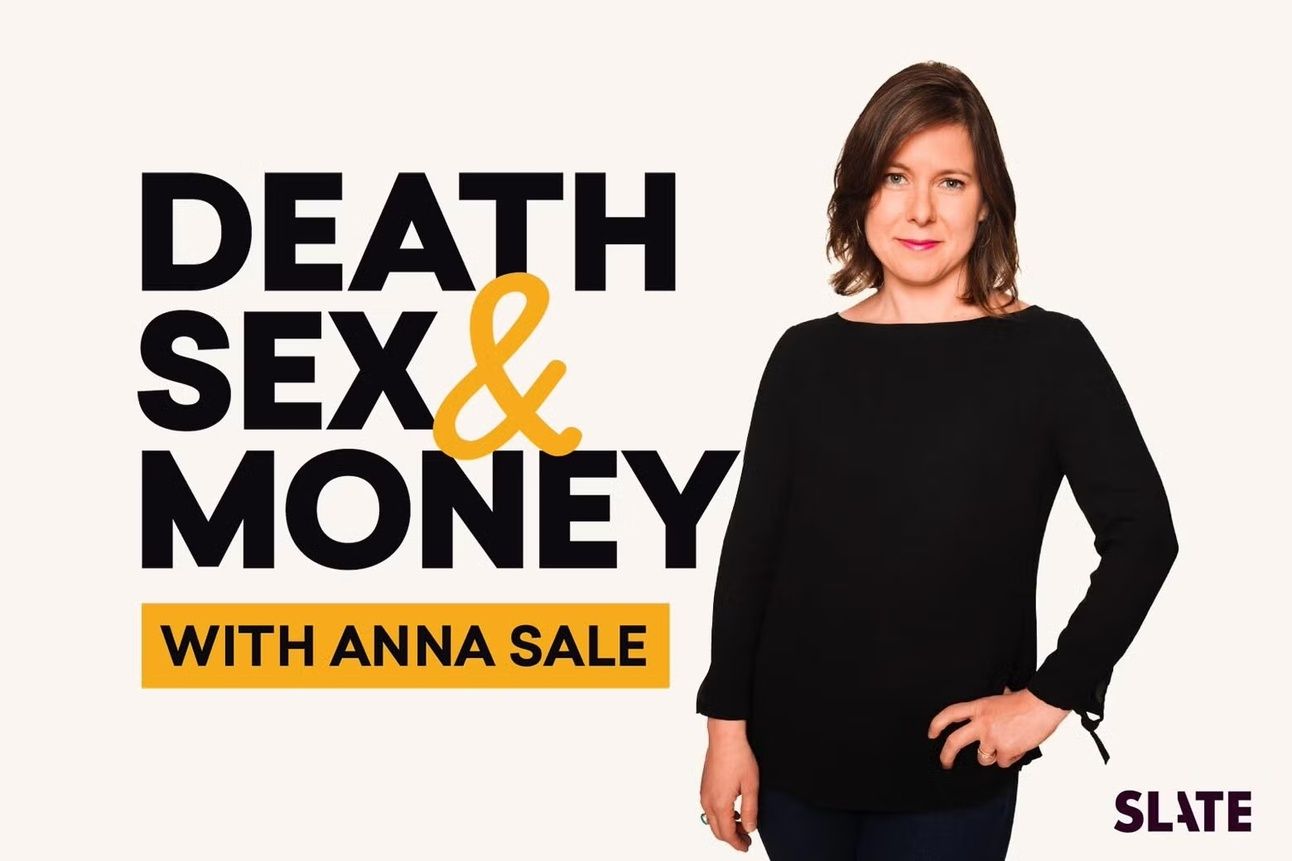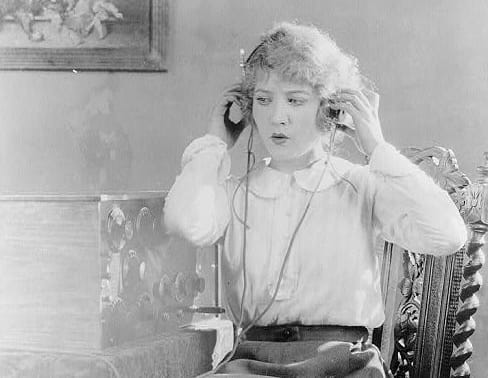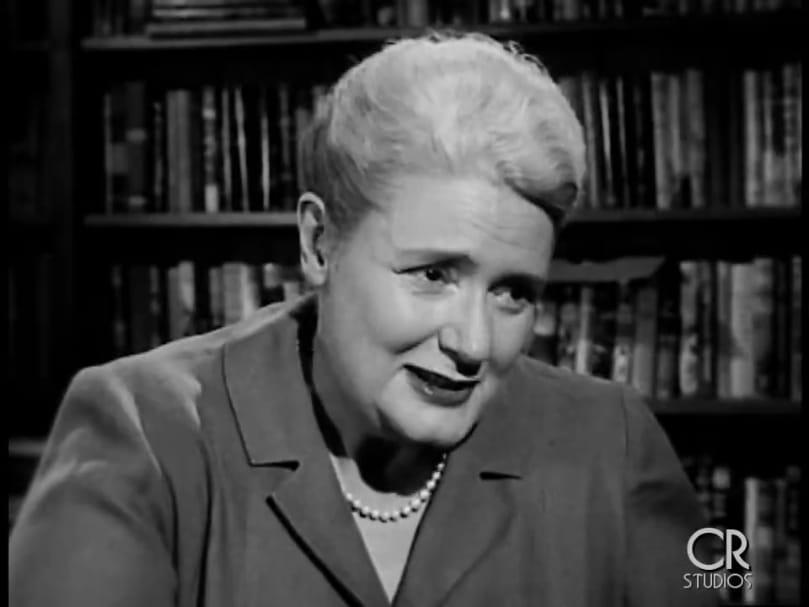As with last week’s post on radio’s messed-up relationship with female voices, this week I’m continuing to unpack the legacy of Mary Margaret McBride, a mid-century broadcasting powerhouse who’s largely been forgotten. I wrote about her at the public media site Transom.
“You just flip it”
McBride set a pattern for a type of program that’s more popular than ever: the personal interview show. These shows are based on free-ranging, informative conversations that we, as listeners, get to eavesdrop upon. At their best, personal interview shows pull us into a kind of flow-state with the guest and host. But these shows have a paradox built into the format: the guests are always changing. What keeps the listeners coming back is the host. And yet the host is always receding into the background of a good conversation, reacting to what the guest says, asking a little more, redirecting and reminding us of things we need to know. The hope is the guests stop performing a version of themselves and really start to think aloud, to find genuine insights, to confess something. That’s when the magic starts to happen.
Back in her day, Mary Margaret McBride was called an “ad-libber.” That meant she worked without a script, something highly unusual on air in the 1930s and 40s, when US network radio was super-scheduled and always live. Experienced broadcasters and performers marveled at how she managed to pull off improvising.
It didn’t always work. “Bob Hope couldn't get over the fact that our show was really ad lib,” McBride recalled about the comedian’s 1950 appearance. Bob Hope sauntered into the studio 25 minutes late, during which time she’d had to vamp to fill the time.
He said: "Mary Margaret, you just flip it. I'm a script man myself. But gee, it's really something just to sit down like this and go easin' along, Miss McBride."
McBride says that Hope kept trying to banter with her, frittering away the remaining 20 minutes of her 45-minute show with jokes. McBride insisted: "Bob Hope, I don't care whether you say one single funny thing today — this is an interview. I want to find out about you."
Bob Hope sounds like he was a wash. But many times, McBride managed to crack through a guest’s shell. Listeners back then rarely heard people bring themselves to genuine tears on the radio, or argue with themselves, or struggle to articulate an emotion. That’s why her show is such an important part of our history, and why the format she and her team refined over two decades is still popular today.
The conversation conductor
The podcaster who most seems to carry McBride’s torch today is Anna Sale, whose show Death, Sex & Money launched in May 2014 at WNYC, and now emanates from Slate. Both Sale and McBride started out as reporters, and both have a trace of Southern lilt to their voices — McBride’s from rural Missouri, and Sale’s from West Virginia. Not only that, but as McBride often did, Anna Sale invites her audience to take part in building the program. McBride’s listener feedback was more in the “good cake recipe” zone, however, while DSM tends towards “I invited my Uber driver on a date.”
I called up Anna Sale to ask if she’d heard of her audio ancestor McBride — she hadn’t, of course. It would be odd if she had. But she was curious to learn more, and so indulged me rambling about various aspects of McBride’s long career. Then Sale related it to her own work in a thoughtful manner. It felt less like an interview than a casual seance with a professional pal and the spirit of a dead great-aunt who’d left a hidden legacy in her will.
Our chat solidified my hunch that the work of good interview shows hasn’t really changed in 75+ years. It’s all about creating a three-way love triangle among listener, guest, and host. And it’s always been far, far harder than it appears from the outside. What follows is an abridged transcript of my conversation with Anna Sale and, from the afterlife, a bit of Mary Margaret McBride.

Anna Sale: I’m looking at what you sent me. She graduated college in 1918: University of Missouri, Columbia. How many women were at the journalism school there? “Well, you can't vote, but you can be a journalist.”
Julia Barton: She had a ten-year career as a magazine and travel writer before she went into radio. And the only reason she went into radio was because she was broke. It was the Depression. She wasn't getting any more gigs and her books weren't selling. And so she took this job at a radio station in New Jersey, WOR. She was supposed to play the role of a grandmother called Martha Deane. And it was the dumbest thing. At about two weeks in, she just said [on air], “I can't do this anymore. I'm not a grandma.”
I had been on the air a little less than three weeks when I killed off Grandma with these words. After that I still wore a nom d'air but at least I was now myself — Mary Margaret McBride, reporter underneath Martha Deane, the name assumed for air purposes. I believe that in every life there is one miracle and that radio, my third career in New York, was my miracle. I was middle-aged or nearing it (depending upon the charity of the estimator) when it happened to me, and I needed a miracle desperately. I had been jobless and broke for nearly four years. I was supporting two people besides myself, I was shabby, disillusioned, and rapidly approaching hopelessness.
JB: She asked the listeners to write in and [tell the station she could] be herself. And then she was like: “I'm fired. I know I'm fired.” But then the listeners wrote in. They saved her.
AS: Oh, that's cool.
JB: And then her producer [Estella Karn] was like: “You need to start interviewing people because this [monologue format] is gonna get boring really fast.”
AS: So she did?
JB: Yes! You’ve also done live journalism, back in the day when you were a reporter at WNYC. What is the quality that you notice about people when they are aware of the fact that they're live? How does liveness change what's happening?
AS: It's interesting. The longer I make recorded podcast episodes, the more I want them to feel more live. As an interviewer, I feel like the goal is to be the conductor of a really interesting conversation. Where the listener feels like they get to listen in, and the person that is being interviewed is not thinking about “which talking points am I landing with?” They're instead thinking about, “Oh, that's an interesting question that this person just posed to me and I'm gonna tell them about how.”
It feels like you're having a real exchange that feels alive. For listeners and for guests and the interviewer, everybody feels like they're in this co-creation process.
When you are a live interviewer, you have less control over the pacing of how things unfold. So you have to be a more assertive conductor. You have to break in — you can't just wait for the person to tell the long, winding answer that's going to be 8.5 minutes long, when you only wanted the first 10 seconds. But I think that my taste at the moment is, I really want to feel like I'm listening to something happening, and not some sound-bites that people cut together “in post” to sound intimate.
JB: Something else I've noticed is that when Death, Sex & Money started at WNYC, there was more interstitial narration. That was actually a feature of the show. Am I correct in thinking that it’s kind of fallen away?
AS: Yeah. I mean, we still certainly do quite produced episodes — our last two episodes were more produced, in that we used archival tape and different interviews and recordings in a single episode. But when it's a one-on-one interview, I’m more interested in thinking on the front end: what's the experience I want to create by the way that I interview? When the show started, it was more intricate, putting together and collaging together and quilting together in post-production. You can make beautiful, really interesting things with both styles. But for me it's more exciting, and it feels more challenging as an interviewer to stay in the tape. “Can we keep it internal?” is our shorthand.
I also think it's more honest to listeners. They can hear when I'm sort of rooting around for something. I think often when you go to tracking in narration [i.e., summarizing part of the conversation as a transition —JB] sometimes it's to cover up for a bad question. Which I'm guilty of!
JB: This is very hard to answer, but do you think guests can tell the difference when you're “live to tape,” basically?
AS: It certainly depends on the type of interview, you know? If you're talking to somebody who's a public figure who deals with the press a lot — or in particular, if you're dealing with somebody who engages with politics and reporters a lot, you will have people wanting to jump on and off the record, and I don't like that. I'm like, “That's gonna ruin our flow, man.”
I think the best is, no matter what their expectations are, when you hear somebody who's being interviewed have a moment of…a pause, because a question has struck them in such a way: “Oh, I’ve never thought of that.”
Sam Fragoso does this really well in Talk Easy. He's such a student of his guests that there are moments where people are like, “Oh, you really paid attention. You actually read the book. So let me tell you everything.”
JB: It’s such a form of flattery, too.
AS: Yeah. I really love that. I just interviewed Isabel Allende. And there are two separate questions where I just start it with, “This might be a naive question…”
I’m asking about the kind of emotional impact of having to go into exile and losing your country. [The question] allowed me to admit: I have never had that kind of experience of having my life ripped away from me because of history and politics. So that's another way to give yourself permission as an interviewer to ask the very basic question.
Since the guests were the backbone of the program, preparation for them was my first consideration. Sometimes I read three books in a single night, making rapid notes until 3AM or after and memorizing details until I was able, when I opened my eyes next morning, to recite to myself more questions and answers than could ever be used in a single broadcast and this without reference to the notes….
"What does she do? Just sits before a microphone and talks! Who couldn't do that?" some people derided. My casual method of delivery, including the way I stammered and reached for a word, gave the impression that I was making everything up right on the spot. And it's true, after a fashion, for I never knew exactly how I was going to say what was packed in my head.
JB: [McBride] also talked about how she's doing this level of prep that's intense. And then, she sounds a little flustery on the air — which I don't think women do as much as they maybe they used to. But the guests step in to help her explain the story, because they feel a little sorry for her.
AS: I mean, that is such an effective strategy for women interviewers in particular. It's basically what I just said about the “naive” thing, like, “Help me understand this.” You know, I think that Mary Margaret was probably quite savvy.
JB: She knew that if she sounded like a know-it-all, she might alienate her guest or her audience, given the expectations about women at the time.
AS: Yeah. It's often strategic to seem like you need a little hand-holding from your guest, so then they'll fill in all the details.
JB: One thing that’s interesting about your show, compared to her show, is there were all these taboos around what you could say on the radio. She tells a story about getting in trouble for saying the word “pregnant.” And she was like, “What word should I use?” I think she settled on “expecting,” but it was just like, “Come on, man.”
I think she got a little more leeway because she was on in the middle of the day and none of the men were really listening. But also she just got bolder as time went by because she was financially independent. She had a staff of [at least] five. She made plenty of money.
She became great friends with Eleanor Roosevelt and she credits her for enlightening her about civil rights and all these societal issues that maybe she was maybe trying to ignore, or encouraged to ignore.
In the early 40s, she started having Black writers and poets and civil rights leaders on her show. Quite often. And normalizing that — because Black voices were just not on the air, except as musicians or as the object of mockery. It was extremely segregated. It was a huge problem and an embarrassment.
Langston Hughes was on her show [in 1942]. She asked him to recite his poetry [including “The Negro Speaks of Rivers”]. She was subversive in this way.
AS: I think the word “subversive" is really important there. When I started Death, Sex & Money, I'd been in newsrooms covering politics. You know, the “respectable” kind of news reporting. And then I switched to doing this personal storytelling, personal interviewing style, and for quite a while I just worked through making sure I [still] felt like my work was important journalism, right?
I think what you're describing is the way what gets covered — in the old days, it was called “the society pages,” or “the home pages.” The private sphere where women were allowed to write, or women were allowed to decide who were the guests and how we can dictate the terms of who's included and who's not.
It’s really powerful because of the way it's defining what community looks like. It's giving listeners new experiences of who they might have a relationship with, be in relationship with.
So it's not perhaps just that she had more leeway thinking about who could be guests and how civil rights conversations — maybe they weren't directly about Civil Rights, capital C, capital R. But they were about: these are people who are in our community and we're going to treat them as equal members of our community.
I think one could argue that it makes sense that when you think of women as journalism pioneers, it is through the form of the interview where they've been most permitted to shine. It's because I can make things happen on my show without saying it directly. I don't have to be declarative, but I can be really subversive. It’s like a sneak attack, right?
Thanks so much to Anna Sale for speaking with me. Go subscribe to Death, Sex & Money and hear how it’s done. She also has a newsletter and a wonderful book called Let’s Talk About Hard Things.
Business as usual? No thanks.
The problem with most business news? It’s too long, too boring, and way too complicated.
Morning Brew fixes all three. In five minutes or less, you’ll catch up on the business, finance, and tech stories that actually matter—written with clarity and just enough humor to keep things interesting.
It’s quick. It’s free. And it’s how over 4 million professionals start their day. Signing up takes less than 15 seconds—and if you’d rather stick with dense, jargon-packed business news, you can always unsubscribe.




